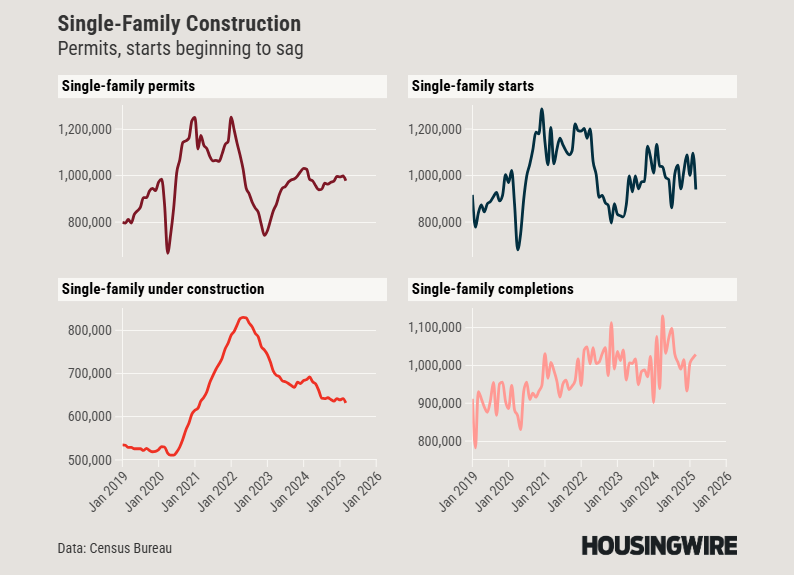Driving mortgage innovation: how AI and digital lending are transforming the sector

The HousingWire award spotlight series highlights the individuals and organizations recognized through our recognition Editors’ Choice Awards. Nominations for HousingWire 20The 24 Tech Trendsetters prizes are open until Monday, September 30. Click here to nominate someone.
If we learned anything from HousingWire’s recent AI Summit, artificial intelligence (AI) is rapidly reshaping lending by streamlining processes, reducing costs, and improving the overall borrower experience. As a result, lenders can scale their operations more effectively, respond more quickly to market demand and provide borrowers with a smoother, more user-friendly experience while lowering costs.
HousingWire spoke with Kevin Wilzbach, director of product management at Wolters Kluwer Compliance Solutions and 2023 HousingWire Tech Trendsetter, to discuss how AI and digital lending solutions are helping lenders navigate a volatile market. From automating workflows to meeting customer demands for better lending experiences, Wilzbach shares key insights about the future of fintech and the technology investments that will help lenders stay ahead.
HousingWire: What’s the most surprising technological transformation you’ve seen in recent years?
Kevin Wilzbach: Without a doubt, the growth in the use of AI and GenAI in particular has been transformative for the banking industry. What is perhaps most surprising to me is the relative speed of its adoption – and the many ways in which lenders and other financial institutions are beginning to explore ways to unlock the potential of AI-generated data as part of their decision support processes. AI has certainly had a transformative effect, helping turn raw data into actionable insights for lenders and providing a competitive advantage in the process. Today, technologies like natural language processing and machine learning have moved from the research lab to something more tangible that commercial enterprises can take advantage of.
Not surprisingly, we are increasingly integrating AI-powered capabilities into our offerings, driven in large part by customer demand for improved lending workflows, along with better operational and analytical capabilities. The ongoing input from our banking customers plays an invaluable role that underpins our efforts in developing integrated solutions that will help lenders be more agile and enable them to scale their offering according to market demand.
HousingWire: Where do you see the greatest need for housing technology? What problems still need to be addressed?
Kevin Wilzbach: While the sector awaits relief in the form of interest rate cuts, there is no quick fix to the associated high short-term housing costs. There is also the challenge of available housing. An increase in inventory is clearly necessary. Increasing the current housing stock, combined with reduced rates, will help improve housing affordability.
However, attention should also be paid to reducing the overall cost of lending. A 2024 study from Freddie Mac indicates that origination costs increased 35% over the past three years prior to the study and are now above $11,600 per loan for private lenders. That is not sustainable for a healthy mortgage sector. Moreover, the regulatory environment is constantly changing, which is associated with increasing burdens on the credit sector. Using technology in smart, informed ways, such as adopting digital lending technologies, can help lenders better manage today’s dynamic regulatory environment, while providing the tools to accelerate and streamline lender origination processes from application to closing. closure.
HousingWire: Will the adoption of digital lending drive more mortgage activity?
Kevin Wilzbach: Our experience working with lenders has shown that the use of digital tools, through increasing automation, will drive greater borrower engagement and facilitate a faster, easier and improved lending experience. Consumer behavior is a powerful driver of the digital transformation, and deploying these digital tools earlier in the lending process leads to a better lending experience.
Housing Wire: Where would you advise clients and colleagues to focus their near-term technical resources as they navigate the current market environment?
Kevin Wilzbach: We recognize that lenders can substantially help navigate the ups and downs of the market by leveraging technology and scaling their efforts accordingly. For example, the adoption of digital lending solutions offers a great opportunity to reduce costs and streamline operations. While we recognize that investments and process changes may seem counterproductive during a market downturn, we encourage lenders to actively plan for the next major market recovery, which will impact first lien and refinance volumes. Too drastic a pullback could impact an organization’s readiness for the expected increase in lending volumes. Recent statements from economists and the half-percentage point interest rate cut by the Federal Reserve announced on September 18 are encouraging signs.
Our advice to lenders is not to take your foot off the accelerator. Now is the time to prepare for a market recovery. If you work with third-party service providers, consider those that have integrated offerings rather than off-the-shelf solutions as a way to accelerate growth as market conditions improve.




